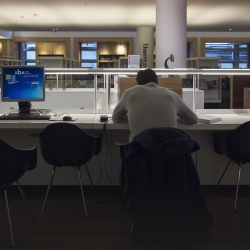To provide the best experiences, we use technologies like cookies to store and/or access device information. Consenting to these technologies will allow us to process data such as browsing behaviour or unique IDs on this site. Not consenting or withdrawing consent, may adversely affect certain features and functions.
The technical storage or access is strictly necessary for the legitimate purpose of enabling the use of a specific service explicitly requested by the subscriber or user, or for the sole purpose of carrying out the transmission of a communication over an electronic communications network.
The technical storage or access is necessary for the legitimate purpose of storing preferences that are not requested by the subscriber or user.
The technical storage or access that is used exclusively for statistical purposes.
The technical storage or access that is used exclusively for anonymous statistical purposes. Without a subpoena, voluntary compliance on the part of your Internet Service Provider, or additional records from a third party, information stored or retrieved for this purpose alone cannot usually be used to identify you.
The technical storage or access is required to create user profiles to send advertising, or to track the user on a website or across several websites for similar marketing purposes.
 Working from home is known to be good for a strong work-life balance, advantageous for employee productivity, and is even touted as being beneficial for the environment. However, telecommuting has also carried a stigma that employees who work remotely have difficulties rising in their career. (more…)
Working from home is known to be good for a strong work-life balance, advantageous for employee productivity, and is even touted as being beneficial for the environment. However, telecommuting has also carried a stigma that employees who work remotely have difficulties rising in their career. (more…)









 Over half of American workers feel they have no one to turn to with a workplace issue, claims new research. The survey conducted by OnePoll on behalf of
Over half of American workers feel they have no one to turn to with a workplace issue, claims new research. The survey conducted by OnePoll on behalf of 
 Accountants are wary about the impact that the government’s IR35 off-payroll tax reforms will have on the UK’s contracting industry and would like to see them repealed altogether, a new survey claims. According to research by
Accountants are wary about the impact that the government’s IR35 off-payroll tax reforms will have on the UK’s contracting industry and would like to see them repealed altogether, a new survey claims. According to research by 




 UK employers claimed £35 billion of free labour last year because of workers doing unpaid overtime, according to an analysis of official statistics published today by the
UK employers claimed £35 billion of free labour last year because of workers doing unpaid overtime, according to an analysis of official statistics published today by the 
 Nearly half of UK workers admit to being greener at home than they are in the office, although more and more are realising the importance of green habits,
Nearly half of UK workers admit to being greener at home than they are in the office, although more and more are realising the importance of green habits, 


 Three-quarters of UK workers see pointless meetings as “normal” and 6 in 10 have attended a meeting that had no productive outcomes, a new survey claims. The research involved more than 4,000 full-time workers in the US, UK, France and Germany, including more 1,000 in the UK. The data suggests that the US undertakes the most zero-outcome meetings, with 8 in 10 respondents saying they have attended a useless meeting in their current job.
Three-quarters of UK workers see pointless meetings as “normal” and 6 in 10 have attended a meeting that had no productive outcomes, a new survey claims. The research involved more than 4,000 full-time workers in the US, UK, France and Germany, including more 1,000 in the UK. The data suggests that the US undertakes the most zero-outcome meetings, with 8 in 10 respondents saying they have attended a useless meeting in their current job. 











